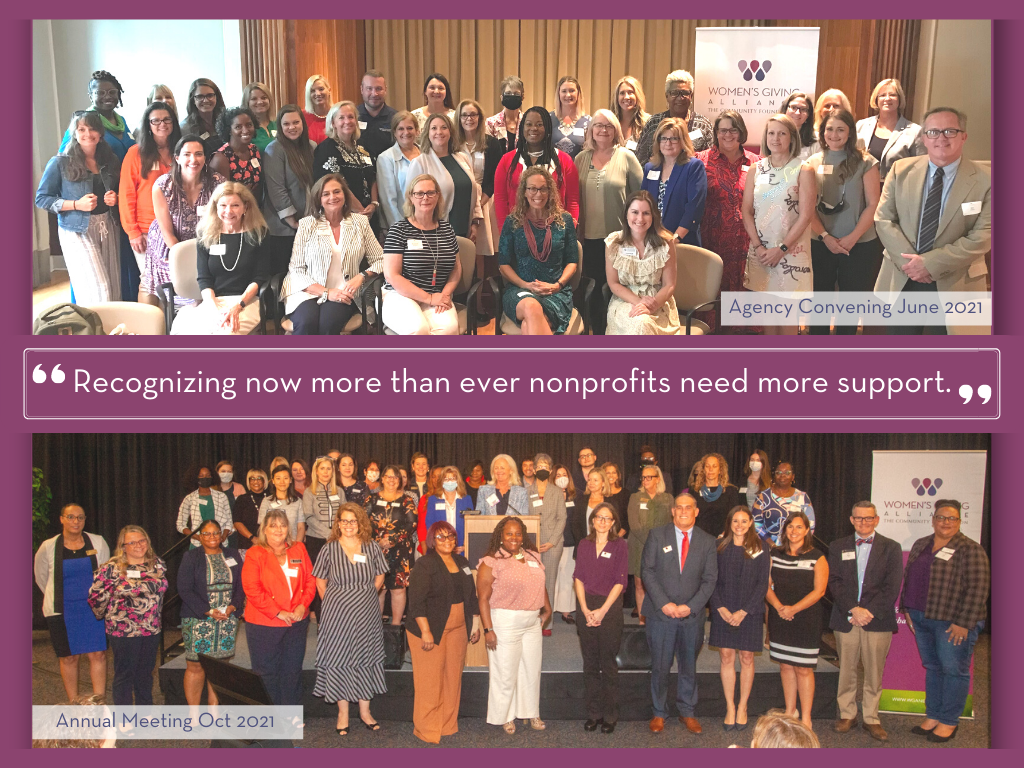When the 2020 grants were awarded in May 2020, the Women’s Giving Alliance (WGA), like everyone, had no idea how long this pandemic would impact “normal” nonprofit life. By the fourth quarter of 2020, WGA’s Grants Leadership Team (GLT) recognized WGA may need to re-think it’s grant focus and associated processes to address the many longer-term issues facing nonprofits who support women and girls. Demand for basic, core mission services were doubling, tripling and quadrupling while revenues declined, staff was challenged, and fundraising events were canceled.

Conducting Research
In early 2021, the GLT began researching how other organizations and foundations were reacting to the pandemic in order to assess how WGA could best support its nonprofit partners. Through conversations with The Community Foundation, other similar foundations and giving circle leaders, as well as scouring leading philanthropy publications, WGA discovered several changes taking place in the philanthropy sector. Many funders are shifting from specific program funding with burdensome application and reporting mechanisms toward a more streamlined approach aimed at supporting a nonprofit’s core mission. In addition, many funders were taking additional steps to shift from being a “funder” to a “partner,” recognizing now more than ever nonprofits need more support. In fact, WGA’s local research indicated many forms of pandemic-related funding available in 2020 when the pandemic first began, such as the First Coast Relief Fund and government PPP, are no longer available. And WGA’s Finance Team discovered there are already budget shortfalls across many Northeast Florida nonprofits, including WGA’s own grantees.
Listening to Partners
The GLT also had the opportunity to speak with WGA’s nonprofit partners in-person about their unique challenges during the pandemic at the Grants Agency Convening in June 2021. This insightful session with 26 nonprofit partners was invaluable to the GLT’s research and gave them a first-hand look at how nonprofits are navigating the pandemic daily. During this meeting, WGA’s nonprofit partners discussed:
- Major challenges that keep them awake at night: Hiring and retaining workers, finding affordable housing for their clients, providing mental health resources, finding quality, affordable childcare and mitigating overall health and safety concerns.
- Support needed from the community: Mission funding to rebuild capacity, relationships and re-engage partners, re-invigorating fundraising, hiring additional staff, developing the leadership pipeline on boards and executive teams, home and family support and finally, a cultural shift in how our society views nonprofit work.
- Direct requests to WGA: More frequent grantee convenings and for WGA members to be involved with nonprofit partner boards and volunteer opportunities.
- Silver linings of the pandemic: Increased reliance on technology led to new efficiencies, such as creative fundraising avenues, virtual programs and the ability to reach more people through tele-services.
The GLT research included an introduction to core mission funding which resonated with the issues and needs heard. Core mission funding is the practice of awarding grants to fund a nonprofit’s basic needs to support their mission’s operations rather than earmarking the grant for specific programs or projects. The WGA 20th Anniversary provided a perfect backdrop for core mission funding. By focusing only on prior grantees, the core mission funding initiative supports those nonprofits who support women and girls.
Taking Action
After analyzing the data, the GLT developed an action plan to shift its 2022 grantmaking strategy to core mission funding in order to help WGA’s grantees rebuild and recover from the pandemic’s lasting effects, including:
- Replacement, restoration, and/or capacity recovery of basic operational needs which may include upgrading facility operational capabilities; re-hiring of furloughed staff; offering health insurance or key benefits to attract and retain staff; and other capacity-building, restorative operational needs.
- Implementation of means to improve efficiencies for delivering services such as expenditures for technology (e.g., hardware, software, WiFi access, tablets, subscription services, or other); augmenting food pantries’ capabilities or nutritional programs; and/or other improvement considerations.
- Delivery of initiatives specific to client recovery from the pandemic, which could include childcare and transportation to allow women to return to work and/or school; access to mental health services for staff and clients; and the like.
To support this initiative, the GLT developed streamlined application and reporting forms and processes; an expanded role for the Evaluation Team and Grants Finance Team to support the “partner” considerations; shortened the grant making timeline and number of steps; planned unconscious bias training for our Decision Teams to enhance equitable grantmaking; and worked across all teams to ensure seamless communications and information.
True to our Mission, Values and Guiding Principles
WGA firmly believes this one-year change in our funding approach reinforces our two-pronged mission: to improve the lives of women and girls by funding real solutions in the community, as well as to encourage women to be more strategic in their giving. All WGA grantees from 2002 through 2021 were eligible to apply for the 2022 grant online. With the application process now closed, the GLT is most enthusiastic moving ahead with 39 applicants totaling nearly $ 1.8 million in requests.
Click here to learn more about WGA’s 2022 grant process
